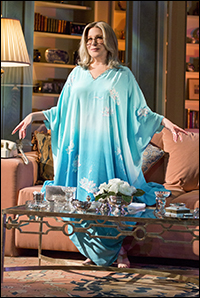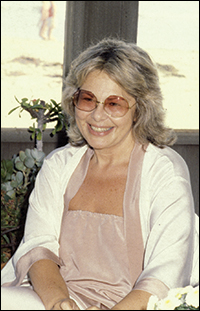
Returning to a Broadway stage for the first time in more than 30 years, Midler stars as the late showbiz “superagent” in I'll Eat You Last: A Chat with Sue Mengers, a biographical solo play penned by John Logan and directed by Joe Mantello. The award-winning performer recently chatted with Playbill about honoring Hollywood's ultimate hostess.
You've performed all over the world, but your roots are in New York theatre. How does it feel to be back on Broadway?
I can't say it feels like coming home because it actually feels like a brand new adventure. I've never done a show like this where I sit and talk for an hour and a half without any music. It's a huge challenge, but it's very exciting.
What does Broadway mean to you?
Well, everything has changed since the last time I was here. But it's full of life, vitality, and great endeavors by very talented people trying to make art. It's the heart of the city. It's irresistible.
In 1974 you won a special Tony Award for your contributions to Broadway, but you haven't been back since Bette! Divine Madness, your third Broadway concert, in 1980. As far as non-concerts, you haven't been back since you left Fiddler on the Roof, your 1967 Broadway debut. Why such a long absence?
I just got busy with other things. I think it was the enchantment of being my own boss, making my own rules, and creating my own possibilities. That became so much more fun.
Broadway producers must have tried wooing you back to the stage over the years.
Yes, I've been asked, but usually it's for a revival. Just last year someone asked me to do Mame. I'm so thrilled that I'll Eat You Last is a brand-new play; it's not me doing my version of Laurette Taylor doing The Glass Menagerie. I love that I get to originate this character—and what a character it is! How did this project come about for you? Were you actively looking to do more theatre?
No, it just fell into my lap. I had finished my two years performing in Las Vegas, and I'd been actively recuperating. It was a really long, hard experience, and I was exhausted. The first nine months after it was over, I really just slept. But coming to the end of that particular road in Las Vegas, I knew I didn't want to do that anymore. I was looking for a new path, a new way to spend the time that I have allotted to me. I was mostly just doing some benefits, raising money for my organization, the New York Restoration Project. Then I got news through my agent that Graydon Carter, who's one of the producers, wanted me to do this. Being a fan of Sue's, both the person and the legend, I read the play, and it was fun. I felt that John Logan had really captured her tone.
What made you want to play her?
She was a self-made person and a very complicated, mysterious character. Sue's personal journey is riveting, and the peak of her power in the '70s was a fantastic time in movie history. No matter what happened, she had to keep a lot of balls in the air. Being Sue Mengers was actually a massive, brilliant undertaking.
 |
||
| Midler in I'll Eat You Last. |
||
| Photo by Richard Termine |
It's much more about capturing her spirit than an impersonation, and there was a lot of spirit there.
And yet you're the spitting image of her, thanks in part to famed costume designer Ann Roth. How would you describe Sue's style?
She was always stoned, so she really wanted to be comfortable. She was quite stylish in her way and quite attractive, but I'm not sure she ever knew it.
She was also a brassy woman who excelled at her job and fought her way to the top of a male-dominated field. In that respect, one could say that you're perfectly cast. Do you feel a kinship with her?
When I first read the piece, yes, I could see there were similarities, because it isn't unlike what I went through. But it's also a very American story to which a lot of people can relate. It's easy to identify with someone on the outside looking in with such will and determination that they make it around the barriers against all odds. It's both a winner's and a loser's story. It's almost Shakespearean.
How well did you know Mengers personally?
After I left Los Angeles in 1994, after the earthquake, I met her on one of my little trips back to L.A. from New York. A girlfriend of mine brought me over to her place, and I adored her at first sight. I went to the parties, the luncheons. Once, I traveled with her to Canyon Ranch to get her health back in order, and of course she thwarted us and never came out of her room. I can't say I was a real intimate because I was never a client, but I saw her Queen Bee side. I was always one of a number of people in the room with her, listening, laughing, having a great old time. She was very polarizing—some adored her and some didn't like her at all—but there was nobody more fun than Sue, and I think that was part of her gigantic success. She was just a real broad. I was very fond of her and I'm delighted to be presenting her to people who didn't have the good or bad fortune to be in her presence.
 |
||
| Mengers in 1976 |
||
| Getty Images |
I didn't want to incommode anybody. I only spoke to the people who were closest to her at the end because I felt the closest to them. I didn't want to be swayed one way or another, because everyone has a Sue story and some people have such strong feelings about her. If I paid attention to all that, I would get quite stressed. She had different faces for different people. She could be very brash and businesslike, drinking and swearing like a truck driver, but also very genteel and classy. Besides, I'm very attached to John Logan and what he's done here. In the theatre the playwright is king; he's written what he's written and doesn't want to hear what you have to say. He wants you to tell the story he wants to tell. He already spoke to a lot of these people himself, so I didn't want to get bewildered by too much additional information. Was any of your research valuable?
People have given me some great clues along the way. I had a meeting with Jennifer Jason Leigh, for example, who had a great take on her physicality. When Sue's parents brought her to New York from Germany as a child to escape the Holocaust, she didn't speak English and went through a lot trying to assimilate. Thanks to one of her friends, I've seen Sue's photo archives, so I've seen pictures of her family, her father, her mother. I've seen her as a young child, a teenager in the Bronx, a starlet wannabe, a young agent, and so on. Through photographs, I've seen something from practically every stage in her life. Photographs don't tell the whole story, of course, but that was very valuable.
Mengers passed away in 2011. What would she have thought of the show?
Oh, she would've loved it. She was a storyteller, and this is a great story, a version of her story that's full of fun, contradiction and bad behavior. Sue didn't have a memorial, so I feel like this show is sort of her memorial. I want to honor her memory and do her proud. I'm working very hard to make sure people see not only the legend but also the soul. I hope that I bring her to life, because if there's one thing you could say about Sue, she was definitely alive.









